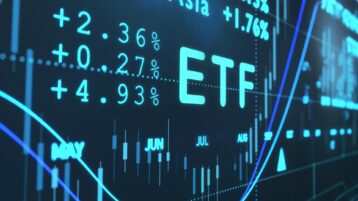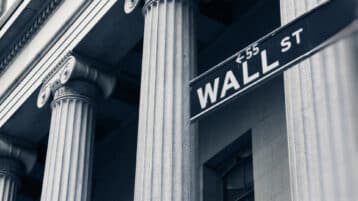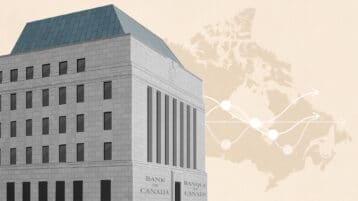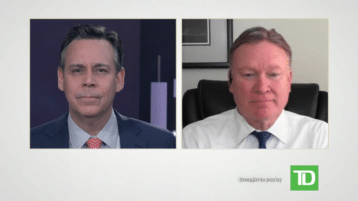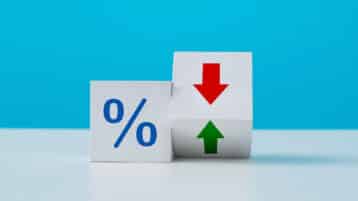Print Transcript
[music] Hello I'm Greg Bonnell and welcome to MoneyTalk Live which is brought to you by TD Direct Investing. every day I'll be joined by guests from across TD many of whom you'll only see here. We'll take you through what's moving the markets and answer your questions about investing. Coming up on today show: will heal from TD asset management Benjamin Chim on the outlook for corporate debt amid aggressive central bank rate hikes. And in today's WebBroker education segment, Hiren Amin will take us through how you can research high-yield bonds using the platform. Here's how you can get in touch with us. Just email moneytalklive@td.com or you can fill out that viewer response box right into the video player here on WebBroker. And before we get to our guest today, let's give you an update on the markets. You have the TSX, up and triple digits. Again of 116 points, a bit more than half a percent. Some money moving into mining stocks, lumber stocks, with First Quantum Minerals, up to the tune of a little more than 3%. 2653 a share. West Fraser Timber holding onto that bid up a little more than 2 1/3%. South of the border, let's check on the S&P 500. A little bit of commentary from different fed speakers about this whole thing. Will it be 50 or 75 basis points? Pretty much dancing around the issue. Of course Jackson Hole is the big event of the week. We'll be hearing from Jerome Powell tomorrow. Let's hear what he has to say about that whole matter. We will be part of that discussion. 4164 for the S&P 500. Up a little shy of half a percent. Let's check on the tech heavy NASDAQ at this hour. Up pretty far. Almost 9/10 of 1%. Salesforce, warning what they call "measured" spending from their business. Down a little more than 6%. And that's your market update. Aggressive central bank tightening has sent shockwaves through the markets while stocking fears of a recession on the horizon. So what does all this mean for health of corporations and investors that hold their debt? Joining us now to discuss is Benjamin Chim. Senior Portfolio Manager for Fixed Income at TD Asset Management. How is corporate debt impacted? >> A lot. Thank you for having me. It's a big driving force as to why you see this in corporate bonds basis in terms of investment rates and high yield. The market has really been essentially repricing bonds to the prospect that interest rates are continuing to rise and the fact that we may potentially be seeing a recession. If not at the end of this year than possibly next year. Spreads and yields are adjusting to that. But, as we sort of think through what the future will look like and how things will progress going forward, we are still sort of thinking about investing in corporate bonds with quite a bit of caution. I think there will be a decent amount of volatility going forward into the end of the year and possibly next year. The reason why we are fairly concerned is that inflation levels are still, as you know, persistently high. The July number was encouraging because inflation did fall a little bit. But were still talking about central bank trying to get inflation down from that 7 1/2 to 8% level to Target of three rather 2 to 3%. Really. There are several elements in terms of the inflation measure that are still pretty sticky. Like rent. You have a chance for inflation to rollover but it may plateau. If it stays there for an extended period of time, that's going to be a pretty challenging backdrop for corporate bonds. We could likely have a recession in that. So credit quality could get compressed and that scenario really is not being priced into markets right now. That's what we see in a little bit cautionary ways. Expect a decent amount of volatility going forward corporate bonds. >> Let's talk about that. So the quality of the corporation an issue, if there's going to be a challenging economic environment, that also befalls high interest rates. >> Yes. I mean the one bright spot and saving grace in corporate bonds going into this. Is that we are coming from a situation, a rather unique situation in that credit quality is pretty good. Much better than we have typically seen when the market heads into a recession. And that is simple because it really has not been that long since we've had that. We have the COVID pandemic. There were lockdowns in the economy were wrote struggling. Struggling to get by with shutdowns… High-yield debt market has it at 10% default rate in 2020. A lot of companies, since then in the last two years, most companies have been focusing on rebuilding. So that has put them in a position today where they are dealing with, what is now a much more volatile and difficult market. They have a lot of flexibility to pursue different avenues to fund their growth. They are in a good spot and that gives us some confidence that even if we do start to see some dislocation in credit markets, were not likely to see what we saw in 2020. >> When we think about all the challenges that we are faced with right now, and and there are no shortages of challenges, it makes sense to tread cautiously. If we were to be optimistic about this space, what could go right in terms of investing in corporate bonds against the larger economic backdrop? What could resolve itself? How can we be a bit more enthusiastic about this space question mark >> I think of central banks end up addressing inflation better than we expect and what the market expects right now, that certainly would be extremely positive for risk premiums. Because that could potentially mean that that soft landing… They will have a hard time meeting it but it could come to realization. If that happens, we will see all this market value improved with corporate bonds. The potential transformative, when you think about the all in yields is pretty decent. Your set up to have some pretty decent long-term returns because the yield investment market right now is 4.7%. The yield on the high yield market is a lot higher than we saw going into this. The concern that we have overall, of course, when you drill down into that yield number, the risk and premium spread following corporate bonds is not as attractive as we usually see in a recessionary setting. The investment rate is now hundred 45 basis points over treasuries and high-yield it is 480 basis points or 4.8%. And typically in recessions, you see much higher than that. For example, with COVID, the high-yield spread hit a thousand basis points. So at 145, 480, we are not even half of that right now. We would like to see more of that, being priced on the markets and so if you are going to invest in corporate bonds, yes there is pretty good potential for long-term returns because of where yields are, but we need to be prepared for a decent amount of volatility. >> The risk obviously, the return, trying to weigh those out… What kind of investment decisions you want to make… You talk about the fact about that headline yield looking attractive but you need to go below the surface to figure out exactly what is happening. I think in terms of dividend pairs. If they invest in high-yield companies and say "look at the size of the dividend". You can say "wow that is a nice number but what's happening with the number there?" >> What's happening below the surface is things can get, yields can get even higher. Right now, we are not in a situation where credit quality is a big concern. It's more about inflation. If the concern starts to shift, it can mean more volatility. >> Great start to a discussion. We will get to your questions about fixed income with Benjamin Chim in just a moment's time. A reminder that you can email us anytime, MoneyTalkLive@td.com or Phil at the viewer response box. Price of the PS five gaming console is getting higher. While PS five demand is high, supply chain challenges and hardware shortages have left the company struggling to meet demand. The price tag for a standard PS five in Canada is jumping from $20-$649. Well several other countries will also see increase, Sony is not raising the price in the United States where it's facing stiff competition from Microsoft's Xbox console. Nvidia is slashing its sales forecast is weaker demand from the gaming and crypto industries take a toll. The chipmaker says it expects third-quarter sales to slip below six dollars rather $6 billion, a 17% slide year-over-year but Nvidia says a decline in demand for its graphic chips will be partially offset by sales to data centre clients in the auto industry. Dollar Tree is cutting its profit forecast for the year. As a discount retailer/prices in an effort to attract low income shoppers, feeling strapped by soaring inflation. Dollar Tree is now forecasting annual profit for up to seven dollars and 47 a share down from an earlier Target of $8.20. The company is pointing to discount at its Family Dollar stores as it tries to compete with the other retailers that have been slashing prices. As households see more of their income going toward food and gasoline. Back with Benjamin Chim. What are your thoughts on GICs versus bonds right now? >> My answer might be a bit of a copout but it depends on the individual. GICs versus corporate bonds, these are very different instruments. With the individual's needs are, particularly with liquidity and risk tolerance, kind of the biggest factors right? When you think about the GIC, you lock-in for about 18 months. You're getting a pretty good yield. I think it's about 3 1/2% or something in that range. You have guarantees that whatever you're putting in, you that you will get what you're some pudding and you'll get it back. You can't really get that capital if you're locked in. If you want to do a renovation or something else, you're not going to be able to get out of GIC. Pretty big cost and penalty to get out. If, when you're talking about corporate bonds, specifically may be a short-term bond fund or 2 to 3 year corporate bond, there, the yields are a little bit higher. We talked about me before 1/2 or 4 1/4. But of course, you are taking on Mark to market. Interest rates will move. And the principle that the individual puts into it may be lower when it comes time to sell at 18 months. But of course, the reverse can also be true. The bond could move up and you can actually get more return than the yield that they expected. So, really, it comes down to risk tolerance in terms of that aspect. Of course, you have the potential for defaults and corporate's where you don't have that for GICs. But when you're talking about investment created bond or a bond fund, that's still very negligible and it's not really a big issue. Finally of course, liquidity, for a corporate bond or a bond fund is much better. Tomorrow, any time, there might be some minor trading costs but… It's really about what your individual needs are. On liquidity and your risk tolerance. >> Good points indeed. Let's get to another question: what companies debt is most vulnerable to rising rates? That's an interesting one. >> Every company of course, has a lot of volatility that could have an impact on earnings. But when I think about the parts of the market that are going to be the most vulnerable here, it's really the weaker credits triple C etc. within that component, you have some issuers that are called "loan only issuers" these loans are floating-rate there. You have a triple C type company that already has a very thin cash flow margin, any time you get a rate hike, that extra interest cost flows straight into their cash flows through the bottom line. We are seeing a lot of cash flow positives turning to cash flow negative. Once your business is cash flow negative you kind of borrow to keep going. Very negative feedback potential for the liquidity crisis down the road. So that part is particularly vulnerable. . Also smaller companies reliant in the last few years for the Capital Market funding to be able to invest in their asset-based and growth overall for their business to try to get to a certain critical mass, for those companies, they were very fundable when interest rates were low. Now, as we see, bond yields a 3%, that's really crowded out a lot of that funding and crowded out a lot of the capital that they used to have. And so they are going to need to borrow to continue their growth trajectory and a lot of times I can be very expensive and these companies can have liquidity problems. Companies like Intech and software have that kind of profile. I think those are the two areas where we see the most concern. >> When you're taking a look at those risks and concerns in those spaces, obviously this is what you do for a living, you're a professional. For the retail investor this can become a tricky game for them. It seems they really have to do some deep homework on a lot of these names if they'll think about investing in their debt, trying to figure out what the underlying fundamentals are. Is it a tricky space? >> Absolutely. It's trickier the further down you go with the risk factor. What you have to really think through his understanding the business. Understand how strong your assets are. You are buying a debt? You're really being a lender. So the most important thing is you're getting your principal back in your interest payments back. So understanding what those assets are, whether they have in a value or they continue to have enough value to cover your interests and whether or not they will be able to grow without needing more capital and diluting further those two things. Those two things are critical when you're looking at stuff that is riskier in this background. >> Great points there. Let's get to another question: this person did a bit of travelling this Summer and ran into some trouble. What's the outlook for airline bonds given the travel chaos we've seen this Summer? >> That chaos definitely hits close to home. My family and I went on vacation. We just came back in last Wednesday. We were aware of the chaos and we were concerned about it. >> You hope to get lucky. Did you get lucky? That's the thing. >> That's the thing we only had one check-in bag because we knew it will be challenging. That was last Wednesday. I'm sitting here talking to you today and I still have that baguette. Everyone listening, try to keep everything carry-on. The chaos is real so try not to check anything in. That aside, digressing a bit, for airline credits, I think they are pretty interested as a company. This sector has become a lot more investable than it used to be. A lot of defaults early on about a decade or 15 years ago. Major teams have gotten a lot better and more efficient at managing airlines. Case in point, we did see a lot of default in airlines in the COVID crisis despite what was going on. So this sector is run better. Companies have actually been doing quite well because of all the massive demand we are seeing for air travel. Everyone wants to get back outpost COVID. One of the things most concerned about was the managing higher fuel costs. 100 250% from where we were a year ago. So far, all of them have been able to pass on those costs through their ticket prices. So we are seeing a decent credit quality improvement there. Where we are concerned, taking a little more caution is we see a deep recession demand for air travel as a whole. It could decline. That could cause these airlines to not meet their Target's in terms of the recovery of travel and whatnot. It could start to pressure their crypto files a little bit. But at this juncture they are looking healthy. >> I remember you dialling back 10 or 15 years ago. There was always a cloud hanging in the airline industry. It's quite telling that considering the extent of the shutdown, what it did to the airline industry, that you didn't see that kind of stress that one would've it expected with a global shutdown almost completely of air travel. > Obviously government assistance helped a lot for these airlines. But they certainly are much more efficiently managed than in the past. >> Fascinating stuff as always. A reminder to always do your own research before making investment decisions. We'll get back with your questions with Benjamin Chim in just a moment's time. Email us anytime at moneytalklive@td. com. now let's get to our educational segment of the day. We've talked about high-yield debt on the show today and WebBroker has tools that can help you research that asset class. Joining us now to discuss his Hiren Amin, Senior Client Education Instructor at TD Direct Investing. Please walk us through the world of high-yield bonds. > Happy to be back again Greg. You know, we've seen the interest rate environment transition from that low interest rate for a few years and now slightly starting to go into that high rate environment. The one thing that is being constant is that investors are seeking out opportunities to earn high income yields from their investments. One of the ways to do this is through those high-yield bonds. Let's take a step back though first. A bond, as we know, is a kind of loan. The yield bond is the amount of money that the borrower, in other words the lender, gets an interest from the borrower. In this case, the borrower would be somebody like the government, provincial or municipal or even a corporate entity. Now the term "high-yield" in fact, is more than just the amount of money that the bond pays. In fact, it has to do with the bond's ratings. That is the accessibility for the company to be able to pay back the money that is borrowed when it sells its bonds to the public. And of course, being able to pay back those key interest payments throughout the life of the bond. Just to paint a picture of this. As individuals, we have credit scores. That deems our riskiness when it comes to being lent money. The higher score you have is an individual, the less risk you are perceiving to have in the eyes of lenders. In the same way corporations were highly likely to pay back their debt, given a AAA rating for example, because the risk of defaulting which means not being able to pay back debt obligations, are fairly low. Due to this factor, they usually have to pay so much but less in interest on their bonds. If you have companies have less than a stellar record on paying their debt or have issues in their business and making those key monthly payments, those bonds are simply going to be riskier that they sell to the public. They will come with lower ratings, often starting at the double bees all the way down to the sea rating. So lenders will lend to these companies, in other words by buying their bonds. Taking on a bigger risk so they can get a bigger reward in the form of higher yields. We used to rating agency services here in Canada. DV RS and S&P ratings. They classify these borrowers into two main groups. We have investment-grade borrowers and those will be anywhere from these AAA ratings which is the highest rating all the way down to the triple B. These will be more secure risk borrowers. Then you have the noninvestment rate category there, the double D all the way down to the sea. These will be more riskier borrowers and this category is also known as the "high-yield bonds" category. More interest so there lenders can receive a higher yield. This category is also referred to as "Jump runs". You risk losing all your investments. After all, one lenders trash can be another's treasure. "Junk run bonds." >> Great overview of this space. Viewers are intrigued watching this. How do you find these high-yield bonds on the platform? >> Absolutely. We are going to go down to our fixed income asset class here. This is where you can do the research of any bonds you're looking for. We created a category for high yields. When you click on this, this will bring you the current inventory available for high-yield bonds that we have. So you can see this list over here. You can also see the interest rates that they are currently paying along with those readings that we just looked at, the DVRS and S&P ratings. So this is the place to research. Once you make your selection from here, you're ready to make your purchase. >> Thank you so much for joining us that was Hiren Amin and the senior client instructor with TD Direct Investing. (. . . ) Before we get back to your questions about fixed income, with Benjamin Chim, a reminder of how you can get in touch with us. Our guests are eager to hear what is on your mind so send us your questions. There are two ways you can get in touch with us: you can send us an email any time: moneytalklive@td.com or you can use a question box right below the screen here on WebBroker. Just write in your question and hit "send". We'll see if one of our guests can get you the answer you need right here at MoneyTalk Live. >> Back now with Benjamin Chim with questions on fixed income. Let's get back to them here's one from a viewer: what's your view on financial space from a fixed income perspective? When I think about the financials, this is a sector we talk about in terms of the strength of an economy. > Yes. Absolutely. It's a very big space. Focusing a bit on the Canadian banks. We've seen a number of them reporting this week. Healthy, solid growth. They are doing okay. That's the big thing about the banks. They are in really good shape right now. Very well-capitalized. Yes they're going to get hit by the housing market. Falling housing prices will probably hit their earnings and balance sheet strength as well. But they have a lot of capital to absorb it. When you look at your typical Canadian, major Canadian bank, look at their uninsured mortgage book, they have a loan value of under 50%. That's a lot of capacity to housing, market declines without eating it to their overall capital. So from that perspective, they are in good shape. But also, you know, when you think through the fact that we are likely to be in a recession, it's going to be a little bit tighter for them in terms of earnings. But, again, we expect it will go through. With some challenges. Nothing that's going to actually impact long-term their credit profiles. >> Are right. What about the United States as well? Is there a reason south of the border if someone is interested in a US financial institution? >> I think the US banks are even in a better position than Canadian banks. Capital levels… They also don't have as much housing issues because the consumer is healthier as well as the housing market not being as inflated. Absolutely. I think the US banks are very interested as a place to invest in bonds. Bonds in general are quite attractive in general. Both Canada and the US. Banks are largely going to issue debt regardless of the backdrop. All they're trying to do is fund lending somewhere else and make a lock and spread. We often get in both markets, bank issues that come at yields that are significantly higher than what you've earned. From yields of similar credit quality from other types of corporations. Because of the fact that they're forcing debt into a more dislocated market. Interesting and attractive opportunities. The debt is mostly five years and under. Which means that not only are they safe, there are also cyclical. Not going to be particularly volatile. >> Interesting stuff indeed. That's the financials. Here's another question on the mind of one of our viewers: the energy sector seems to be awash in free cash flow. How are the corporate bonds positioned? >> Yeah, just like in equities,… Strong sector. In corporate bonds. Like you said, it's the cash flow that has been extremely strong with high energy prices. I've been very impressed with what the financial discipline in this regard. Most have been focused on reducing their debt levels and paying down maturities. We've seen this very steady over the course of the last year or so. A re-rating of the sector that is stronger in terms of credit. And I think that's gonna continue for the foreseeable future. Where we get a little bit where we are watching out for things long-term, at some point, they will have to start shifting from improving their balance sheets to return capital shareholders. A lot of shareholders have waited a long time to get some capital returns. So when that starts to happen, it will be a little bit more of a negative incremental move for the credit quality. We don't see that happening soon. But that's something potentially down the road. We are watching carefully and always listening to these calls and whatnot. If there is a change in tone there. >> What about the energy transition? Does this put some of the bigger Canadian energy names under, at least, a topic of discussion, five, 10, 15 or 20 years from now, what does the sector look like if we do indeed have a successful shift in our energy sources? >> They will have invested successfully and a lot more renewable energy sources, cleaner energy sources. Yes, being able to generate more free cash flow gives a lot of the bigger energy companies the ability to make that shift easier. We are seeing that with most of the larger capital energy companies. I think it's a really good development. What's good for the environment, cleaner for the environment, is good for us. >> This is the next question and I didn't plan it that way: I'm interested in sustainability bonds. What is your view of this space? Maybe a little explanation for those who are familiar? >> These are bonds that have labels on what their ESG aspect is. For example we have green bonds which are dedicated towards funding green projects or environmentally friendly projects. Be it water or greenhouse gas emissions. You have social bonds were companies raise money to dedicate the proceeds towards more social objectives. For example, access to food or access to other kinds of resources or helping areas in the world where they have less resources as a whole. Then you have sustainability bonds which can be either green or social. In all the cases for sustainability label bonds, the proceeds that they raise our earmarks. So a company can't raise a green bond and then use it just to pay a bonus or for some other purpose. It gets put into a specific account and that gets audited in terms of how they use those proceeds and what types of projects they use it for. Right now, because of the fact that most companies that issue these kinds of bonds are not really the ones in favour, we talked about how energy… We talked about when you look at inflation, a pretty good run. It did for a while. Utilities, because of their defensive nature are pretty popular place to invest in. Those are all companies that are not really ESG friendly. Emissions and not particularly strong when it comes to environmental impacts. It is so, you know, we've seen a focus on sustainability fall to the sidelines a little bit after being a pretty big focus for the past three years. I think that kind of creates an interesting opportunity. Because at some point, as the noise starts to fade, investors start to get more comfortable with how the economic backdrop is going to evolve. They start to care about social responsibilities of the company. Meaning the admission Target's that we talked about for the next 5 to 10 years. Being able to transition. Through that, I think they will start to prioritize and reward companies that make more of a commitment towards that. It's not something that I think markets will focus on in the next six months because of everything that is going on. But at some point they will lean towards it. >> Very interesting. We'll get back to your questions for Benjamin Chim in just a moment's time. As always, make sure you do your own research before making investment decisions. You can get in touch with us any time. Send us your questions. There are two ways you can get in touch with us: you can send us an email any time@moneytalklive@td.com or use the question box below the screen here on WebBroker. Just write in your question and hit "send" will see if one of our guests can get you the answer you need right here at MoneyTalk Live. With the latest reading on economic growth, joining us now is MoneyTalk Live's Anthony Okolie. >>… An annualized rate … Consequently, the second estimate topped consensus estimates or forecast rather by a .9% decline. A couple of more revisions here. Consumer spending rules by 1.5%. That's up from the advanced estimate of the 1%. Gains concentrated in service spending, again, more people were spending on accommodation, restaurants, air travel. Spending on goods were lower in the quarter. This was driven by the shift we have been seeing and spending habits as consumers are coming out of the pandemic. Now, business investment was flat in the second quarter. That was an improvement from the previous estimate of nearly a 4% decline. Residential investment was down 60%. That cut headline growth. And finally inventory investment was revised to touch higher. Slightly lower, 1.8%. From GDP growth. Despite those upward revisions, the latest estimates still show that the US economy contracted for a second consecutive quarter, generally considered an official indicator of a recession. However, TD economics believes that the US economy is not in a recession but it remains inexpensive Tory territory. Greg? > That's the first half of the year. What about the quarter we are living through right now? >> TD economics expects that GDP growth will not come and weaker. They expected to hover around 02 half a percentage. They expect consumer spending and business investing to accelerate in the next quarter. That should offset what we've seen in housing as well as a pullback in inventory investments. >> All right. what about the Fed… > Alright we should not rule out 75 basis points rate hike especially if we get any surprises in the August inflation and employment jobs report. > Great stuff as always. Thanks for being here Anthony. >> My pleasure. >> Anthony Okolie from MoneyTalk Live. Let's check in here on the updates. Mining stocks and forestry stocks… Let's check in on LightSpeed right now. 26 bucks and $0.34 a share, up about 2 1/2%. One of the materials stocks tech right now, 4733, up a little more than 2 1/2%. South of the border, let's check in the S&P 500. We have central bankers converging on Jackson Hole for their big annual meeting. We'll hear from Jerome Powell tomorrow. We will be reading every tea leaf of that. Let's see how we feel about this idea of a pivot. The idea we've been wrestling with all Summer. Right now some green on the screen, the S&P 500 and tech heavy NASDAQ, a little stronger indeed. Almost 3/4 of a percent. Let's check in on Snowflake, a data firm. We are back now with Benjamin Chim of TD asset management. Coming in a question just off the platform in the last couple of minutes. His 4% a good return on a one year GIC or should I wait for rates to go higher? The crystal ball future question. >> That's a tough question to answer. I would say if the question is will our rates go higher, I would say it will. This program, talking about how the question is will he get 50 basis points or 75? I think clearly we will see more rate hikes. What we will see in September is may be 50 to 75. It likely won't be enough to get inflation down so we can see rates go higher than that… When you talk about that and in the context of one year, you might be able to get more. But it's always tough to time these things. In one year there's a pretty good guaranteed return of 4%. Really not bad to have either because you will have volatility. We'll have something else. >> GICs, we had a lot of questions and for good reason. The rates were so low. True, obviously, if there is an influence in terms of central banks, but these are also the funding needs of these institutions. I think, at least from my point of view, sometimes it makes it harder to read too. I don't think I can say with certainty what exactly will happen next with the rates. There are sort of a few things at play. >> Absolutely a few things at play. I'm a credit analyst and I would rather have a corporate bond because I fully understand those things a bit better. Because of the ins and outs of what's going on in the bank. You can get a little higher return on let's say, a one or two year corporate bond. 100 basis points spread on that sort of 3 1/2%. You're sitting on the one and two year period so you're getting about close to 4 1/2% for a corporate bond. If you do your work and understand the risks, you can actually get a pretty good return there as well. >> Interesting stuff. Another question globally: what areas are looking interesting and fixed income currently? >> When you think about bonds and fixed income, I would say, very clearly thinking through yields and returns, the fund, the front end of the market is pretty interesting right? That can be government bonds or corporate bonds. Because, you know, as I mentioned, you get three to half percent yield or as of the close to that for a two-year bond, you're getting more yield and any move in interest rates is much more accentuated in terms of volatility. You're getting more yield but also less volatility. So the front end is very interesting just from a rates perspective. The corporate bond spread. As I mentioned, spread in a two-year, triple B which is pretty high quality, you're getting about 100 basis points. From 1/3 year, your spread is 200 basis points. A lot can happen to a company in terms of credit quality over many years. You are not getting that well compensated. The front and overall I think is much more interesting. The other part of the market, I would say, that I find pretty appealing, kind of a little bit early on on this thought process: but in Europe, things have been quite a bit more intense in terms of credit markets. There are closer to a recession. They are more reliant on Russia and Ukraine for energy. So all this has created a decent amount of dislocation. You can buy bonds from issuers here in North America where if you by the European bond, you can earn an extra one or 2% buying the Eurobond you're not really taking on credit risks because of the dynamics the two markets. There are opportunities there as well have flexibility to move around and take advantage of these dislocations. >> Very interesting. We have time for one more question. This one like a final thought for the show, an overview. When looking at bonds, what questions do you ask yourself before buying? What criteria do you use? >> I talked about the fact that when you buy a bond, you are really lending to a company. Your biggest concern is "am I going to get my principal back during that period? " When we analyse a bond, we think about a bond investment, our focus really is "what are the qualities of those assets?" Are we buying good quality assets that will increase in value over time, or are they going to generate good cash flow? If both of those things are happening, then our concern about whether or not we are getting paid falls away. So that is one of the most important things about investing in bonds and picking through a company and which companies to invest in. The other thing we think about and prioritize is "what is the quality of the management team?" A good management team will know how to optimize those assets and make sure that we can get well covered. The other thing about good management teams is most of the ones we like the best are the ones that manage the company for all the stakeholders, not just shareholders. When they do that, they are really kinda focused on creating broader value rather than thinking about how they will pay a dividend or buy back shares. We found over history that if you invest in companies that focus on that, where their management team is thinking about all the stakeholders, those of the ones that have the most stable and consistent credit quality improvement. > Fascinating stuff. Great insights. Thank you so much for joining us Benjamin. >> Thanks for having me. >> That was Benjamin Chim, Senior Portfolio Manager for Fixed Income at TD Asset Management. Stay tuned we will have Jennifer Nowski on Tuesday. That's all the time we have for today. Thanks for joining us and we will see you tomorrow. [music]


